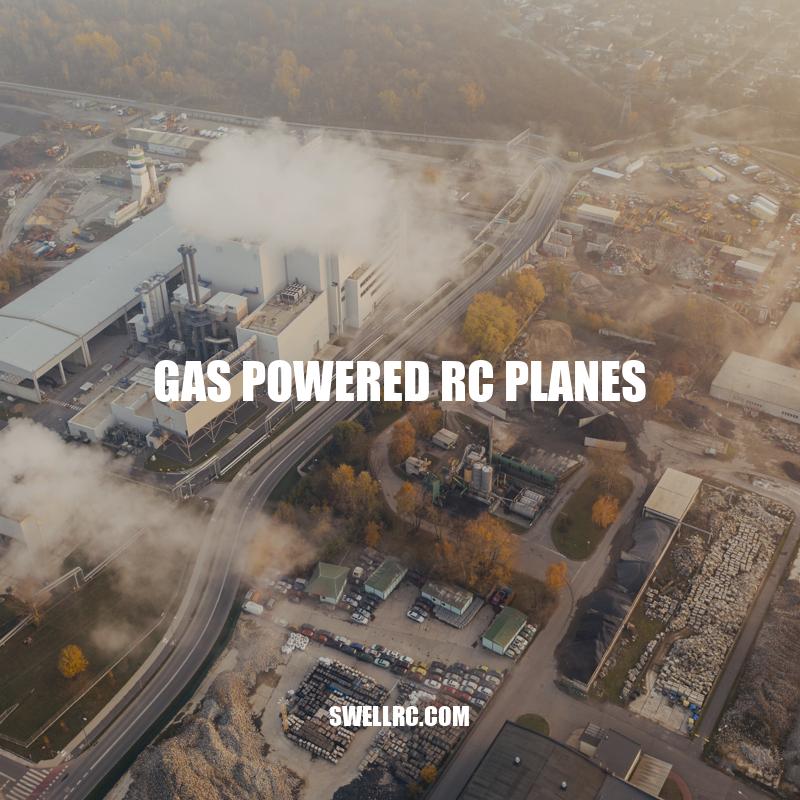Exploring Gas-Powered RC Planes: Features, Benefits, and Flying Experience
Remote-controlled aircraft have been a favorite hobby among amateur pilots for decades. The ability to emulate the flying experience of a real plane with a miniature version in your backyard or local park is a thrill that many aviation enthusiasts can’t resist. Gas-powered RC planes have become an especially popular choice among hobbyists in recent years due to their added realism and increased power compared to electric planes. These planes run on internal combustion engines that burn a mixture of gasoline and oil to generate power, providing a unique level of authenticity to the flying experience. In this article, we will delve deeper into the world of gas-powered RC planes, examining their operating engines, types of planes, flying experiences, required maintenance, and average costs. By the end of this article, you should have a clear understanding of what it takes to be a gas-powered RC pilot and whether or not it’s the right hobby for you.
Gas-powered RC planes utilize internal combustion engines to generate power for the plane. Here are some key things to keep in mind when considering gas engines for your plane:
- Gas engines are typically more powerful than electric engines and can offer longer flight times.
- The engine requires a special blend of gasoline and oil, making fueling more complex than electric planes.
- Spark plugs and carburetors need to be checked and replaced regularly.
- The sound of the gas engine adds authenticity to the flying experience.
- Popular gas engine brands for RC planes include Zenoah, DLE, and OS Engines.
One of the benefits of gas-powered RC planes is their powerful engines, which are more reminiscent of real aircraft. Fueling and maintaining the engine can be more complicated, but for many hobbyists, the increased power is worth the effort. Popular RC plane brands such as Horizon Hobby and Tower Hobbies offer a wide selection of gas-powered planes to choose from. Additionally, access to instructional websites like Gas Power RC Planes and RC Universe can help novice and advanced hobbyists with maintaining and troubleshooting their engines.
Do RC planes use gas?
Gas powered RC planes use the combustion engine technique. They are propelled by compressed carbon dioxide gas which comes out from the back of the plane. These engines are modified further to include pistons. For more information, you can check out websites such as Horizon Hobby and Tower Hobbies which offer a variety of gas powered RC planes.
Plane Types
There are various types of gas-powered RC planes available for hobbyists. Here are some of the most common types:
| Plane Type | Description |
|---|---|
| Scale Models | Designed to look like real aircraft, these planes are built to scale with attention to detail, such as adding cockpit instrumentation. |
| Sport Planes | These planes are designed to offer a fun flying experience for pilots of all skill levels. They tend to have fat wings which provide excellent stability and control. |
| Aerobatic Planes | These planes are designed for advanced pilots who want to perform stunts and tricks in the air. They feature a sleeker design for better aerodynamics, and high-powered engines for impressive speed and agility. |
Scale models are often preferred by experienced hobbyists who want to recreate the look and feel of real planes. One popular scale model is the Balsa USA Fokker Dr.1 Triplane, which is designed to look like the aircraft flown by the Red Baron. Sport planes, on the other hand, are more focused on fun flying and can be enjoyed by pilots of all skill levels. One popular sport plane is the Great Planes Super Sportster ARF, which is known for its stable flight characteristics. Aerobatic planes are built for advanced and experienced pilots who love the thrill of performing stunts and tricks. One popular aerobatic plane is the Hangar 9 Ultra Stick 30cc ARF, known for its precise handling and exceptional power. Websites such as RCGroups and FlyingGiants offer a wealth of information, including product reviews, flying tips, and user forums for various types of gas-powered RC planes.
What is the best aerobatic plane?
There are several great aerobatic planes on the market, but according to experienced acrobatic pilots, the Extra 330SC is considered the world’s leading aerobatic plane. Other top contenders include the Edge 540, Pitts S-2C Series, and Sukhoi Su-29.
Flying Experience
The experience of flying gas-powered RC planes is both exhilarating and challenging. Here are some of the things you should know about the flying experience:
- Gas-powered planes offer more power and speed than their electric counterparts, giving you the ability to fly longer distances and perform advanced stunts.
- The sound of the gas engine adds to the realism of the flying experience and can be an added thrill for many pilots.
- Gas-powered planes typically require more skills to control than electric planes, so it’s essential to practice and be patient when learning to fly.
- Unlike electric planes, gas-powered planes require a break-in period for their engines, where the engine runs at low speeds to allow parts to wear-in properly, and for the fuel system to tune in.
While it may take some time to get accustomed to piloting a gas-powered RC plane, the experience can be rewarding for those who enjoy a challenge. Websites such as RC Universe and RC Groups offer a wealth of information about flying techniques, as well as user forums for exchanging tips and tricks with other pilots. Before buying a gas-powered RC plane, it’s essential to research the various models and find one that fits your skill level and flying preferences. Many hobbyists find that starting with a simpler model, like a sport plane, can help them acquire the control skills necessary to move up to more advanced planes.
What are the cons of Nitro or gas powered RC planes?
One major con of nitro or gas powered RC planes is that their engine noise may disturb your neighbours, and they may not be allowed to be used on some RC tracks. Additionally, they require more effort and expertise to break-in, tune and maintain compared to electric RC planes. However, the learning curve is manageable and they are not difficult to operate.
Maintenance
Gas-powered RC planes require more maintenance than electric planes due to their internal combustion engines. Here are some of the things you should know about maintaining a gas-powered RC plane:
- The oil and fuel mixture used in gas engines can leave behind residue that can clog the carburetor and other engine components, so it’s essential to clean them regularly.
- Gas engines also require regular oil changes and spark plug replacements to ensure proper operation.
- The fuel system must be maintained correctly to prevent malfunctions, including blockages or leaks.
- Store the plane safely and responsibly, with its fuel drained to prevent corrosion and unwanted reaction of fuel components.
While the maintenance requirements of gas-powered planes may seem daunting, many hobbyists enjoy working on their planes and find it to be a rewarding experience. Regular maintenance can help ensure that your gas-powered RC plane remains in excellent condition and is ready to fly when you are.
Various online retailers such as Amazon and Horizon Hobby stock the necessary tools and equipment to accomplish specific maintenance procedures for your plane. Additionally, specialist RC websites, such as NitroPlanes.com and Tower Hobbies, offer high-quality gas-powered RC models and a wide range of spares for maintenance and repair.
Can a gas engine run on motor oil?
Yes, many classic car owners run their gas engines on motor oil. This is because some brands of motor oil contain more zinc, which provides better protection to flat-tappet camshafts. It is important to choose the appropriate viscosity for your engine. For more information, you can visit the websites of popular motor oil brands such as Pennzoil, Mobil 1, and Valvoline.
Gas-powered RC planes are usually more expensive than electric models but offer many added benefits, such as longer flight times and more robust performance. Here are some things to keep in mind about the cost of gas-powered RC planes:
- The price of the plane and engine varies depending on the make and model, with some high-end models going up to several thousand dollars.
- The fuel and oil needed to power the engine can add a substantial cost to the overall expense of operating a gas-powered plane.
- Battery-powered planes need less maintenance, with fewer components and moving parts, reducing the cost of maintenance.
Although the initial cost of a gas-powered RC plane may be high, many hobbyists believe it is worth the investment for the added performance and the satisfaction of flying their plane. The model and make typically dictate the price of a gas-powered RC plane. A beginner may find the price tag for a basic gas plane to be around $350-450, while the more advanced models could cost upwards of $2000.
Whatever your budget or flying experience, there are various online retailers such as Amazon, eBay, and RC Planet that stock a wide range of gas-powered RC planes to suit your needs. You can compare prices, browse features, read customer reviews, and get started on creating your perfect flying experience with a gas-powered RC plane.
How much does making an RC plane cost?
The cost of making an RC plane can vary depending on the kit you purchase and the tools you already have. Generally, a beginner’s kit will cost around $400. However, it’s important to note that many kits come with poor quality hardware that may need replacing. Additionally, building your first plane will require around $100 in basic tools, glues, and a small building board.
Conclusion
Gas-powered RC planes offer a unique flying experience that is challenging, thrilling, and rewarding. From the sound of the engine to the realism of the plane’s design, the hobby has a lot to offer. These planes are not without their drawbacks, though, as they typically cost more than battery-powered models and require more maintenance. Ultimately, the decision to purchase a gas-powered RC plane comes down to personal preference, budget, and skill.
If you’re new to the hobby, it’s worth starting with a smaller-sized, low-cost plane and learning the basics of flying before investing in more advanced models. As your experience and skill level increase, you can explore higher-end models with added features and performance capabilities.
Whichever type of RC plane you choose, there is a vast online community of enthusiasts and hobbyists willing to share their knowledge and experiences to help newcomers get started. With a bit of research, practice, and dedication, you can enjoy the thrill of flying your own gas-powered RC plane in no time.



